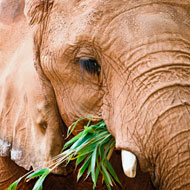Illegal Wildlife Trade Review launched in Malawi

Wild animals in Malawi are significantly affected by poaching and illegal wildlife trade.
A technical review on illegal wildlife trade has been launched in Malawi.
According to the Born Free Foundation, the review will be used as a framework for the development of the Malawi government's Illegal Wildlife Trade Action Plan.
Investigations, research and interviews engaging all key government agencies and NGOs were key to the assessment.
The project team also carried out a review of the National Parks and Wildlife Act of Malawi. They have presented recommendations for a Parliamentary Review that will ensure that the law is strengthened and more compliant with the CITES Legislation Project.
Speaking at the launch ceremony, Hon Kondwani Nankhumwa, information, tourism and culture minister, said: "Wildlife crime is high on the agenda in Malawi as we are well aware of the impact it it having on our wildlife, which is extremely valuable to us, not just in terms of it contribution to tourism and the economy but also to biodiversity.
"Thanks to this report we now know the full extent of the challenge and will be able to respond accordingly."
Recommendations in the report cover legislation, data collection, law enforcement and prosecution. It is hoped that the key actions highlighted in the assessment will help to combat illegal wildlife trade throughout the chain.
Adam Roberts, CEO of the Born Free Foundation, said: "Wild animals in Malawi - elephants, hippo, turtles and many other species - are significantly affected by poaching and illegal wildlife trade. I hope that the recommendations in this comprehensive and detailed report will enable national decision-makers in the country to tackle this trade, benefitting Wildlife in Malawi and throughout the region."
The report was produced on behalf of Department of National Parks & Wildlife by GIZ, Lilongwe Wildlife Trust, the Born Free Foundation and the International Environmental Law Project.



 The Veterinary Medicines Directorate (VMD) is inviting applications from veterinary students to attend a one-week extramural studies (EMS) placement in July 2026.
The Veterinary Medicines Directorate (VMD) is inviting applications from veterinary students to attend a one-week extramural studies (EMS) placement in July 2026.